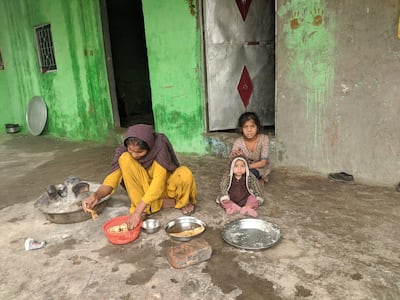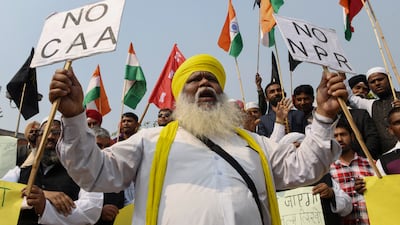The Indian government announced on Monday it was implementing controversial legislation that will grant Indian citizenship to persecuted minorities from three neighbouring countries – except if they are Muslims.
The Citizenship Amendment Act grants Indian nationality to Hindus, Jains, Christians, Buddhists, Sikhs and Parsi immigrants who came to India from Bangladesh, Pakistan and Afghanistan before the end of 2014.
The law excludes Muslims and the ruling Hindu-nationalist Bharatiya Janata Party has been criticised for the "divisive" move ahead of the coming national elections.
“Ministry of Home Affairs (MHA) will be notifying today, the Rules under the Citizenship (Amendment) Act, 2019 (CAA-2019),” India’s Home Ministry said on X, formerly Twitter.
“These rules, called the Citizenship (Amendment) Rules, 2024 will enable the persons eligible under CAA-2019 to apply for grant of Indian citizenship,” it said.
The Home Ministry added that a web portal has been launched for applicants who entered India before 2015 to apply for Indian citizenship.
“The applications will be submitted in a completely online mode for which a web portal has been provided.”
The legislation was first passed by the Indian Parliament in December 2019. It led to months-long nationwide deadly street protests, particularly by Muslims, over claims it was discriminatory and went against India's officially secular constitution.
At least 100 people were killed in violent clashes across several Indian cities, including in capital Delhi where sectarian riots left 53 dead.
Prime Minister Narendra Modi and BJP politicians criticised the protesters and called them “anti-nationals” and "traitors".
The government put the legislation on hold in early 2020 after the outbreak of the Covid pandemic, before Monday's announcement brought the law into effect.
Critics fear the new citizenship law, in tandem with a proposed federal policy to create a national registry for all, will specifically target Muslims if they fail to prove their citizenship.
Millions of illegal immigrants, both Hindus and Muslims mostly from Bangladesh, are alleged to be living in India.
Although Hindus can claim immunity under the new citizenship law, Muslims could be deported or left stateless.

The latest announcement was met with strong reaction from opposition parties, which have accused Mr Modi’s government of a ploy to polarise the electorate. The national poll must take place by May.
“The timing right before the elections is evidently designed to polarise the elections, especially in West Bengal and Assam,” Jairam Ramesh, parliamentarian from the main Indian National Congress Party, said in a post on X.
Mr Ramesh added the government was using the CAA to distract voters from the electoral bonds after India’s Supreme Court scrapped the system that allowed political parties to receive funding anonymously.
BJP was the biggest beneficiary of the system that received 52.7 billion rupees from a total of 92 billion rupees ($1.1 billion) from 2018 to 2022.
The court has ordered the State Bank of India that sold the bonds to provide details of the donors by the end of Tuesday.
“It also appears to be an attempt to manage the headlines after the Supreme Court’s severe strictures on the Electoral Bonds scandal,” Mr Ramesh said.
Mamata Banerjee, the firebrand leader and chief minister of eastern state of West Bengal, said her government would not enforce the law.
The state shares a border with Bangladesh and is home to more than 31 million Muslims – 30 per cent of the state's population.
“You should have notified the rules six months ago,” Ms Banerjee, the chief of Trinamool Congress Party (TMC) said in a televised address.
"If anyone’s rights are taken, then TMC will raise its voice against it. This is BJP’s publicity ahead of the elections."


